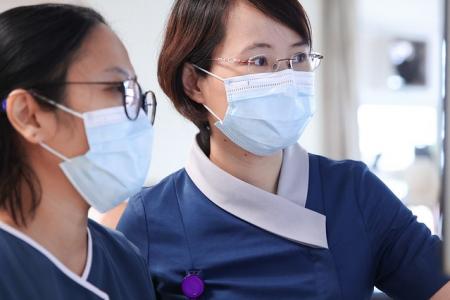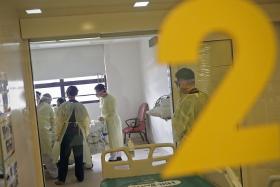Pandemic has been tough, but she has no doubts nursing is her duty and calling
For some nurses, their job is just a job. For others, like nurse clinician Chen Lin, it is a calling.
When Covid-19 cases started to fill hospital wards in February 2020, the 42-year-old donned layers of personal protective equipment and attended to patients infected with a virus doctors then knew little about.
While her shifts at Tan Tock Seng Hospital ended each day, her role as a caregiver did not. It continued into the night as she returned home to her three children – the youngest of whom was just nine months old at the time.
Tending to her children after long shifts was exhausting, and the worries about infecting her family plagued her mind, said Ms Chen, who moved to Singapore from China 24 years ago.
“I was so scared that I’d bring the virus home to my children,” she said.
Such anxieties were compounded by the departure of her in-laws, the main caregivers for her three children, in early February. They had returned to China to be with their family there.
Ms Chen and her husband now had to take care of their infant son and two other children while working long hours during the day.
Despite such difficulties piling up, Ms Chen said she never wanted to quit as nursing was her duty and her calling.
For her resilience amidst the chaos of a pandemic and the initiative she displayed at work, the nurse received the Nurses’ Merit Award on Wednesday (July 6).
The national award recognises nurses who have upheld the high standards and values of the vocation. She was one of 14 nurses from Tan Tock Seng Hospital who received the award this year.

Ms Chen had initially followed in the footsteps of her parents – both doctors – and enrolled in medical school back in China.
An offer of a nursing scholarship which required her to work in Singapore and her own desire to care for patients then convinced her to switch to nursing.
Being away from her parents and elder brother was difficult, she said, but she would visit them at least once a year till China closed its borders during the pandemic, making 2019 the last time she had seen her family in-person.
Frequent video calls kept Ms Chen up-to-date with how her elderly parents were coping. She said they had adapted well to lockdowns and other Covid-19 measures in China.
As retired doctors, she said her parents understood the importance of the national measures, and had picked up new skills as they adjusted to the changes in lifestyle, such as her mother learning to shop online.
Singapore also introduced strict measures when the number of Covid-positive patients surged in March 2020.
Ms Chen, who attended to elderly patients infected with the virus, soon realised that many of them lacked the social support to be discharged back to their homes.
“Many of these patients needed more care because of their weakened immune system, but I realised that a lot of them did not have family, or anyone to care for them,” she said.
The nurse thus aided in the transformation of existing wards into specialised Covid-19 treatment facilities for patients who needed longer rehabilitative stay, eventually turning two entire levels of subacute wards into rehabilitative wards.
Aside from the conversion of existing wards into Covid-19 recovery wards, the nurse led an in-patient vaccination team which catered to elderly patients whose immune systems were still vulnerable.
The team, helmed by Ms Chen, adopted the medical protocols from Covid-19 vaccination centres and successfully administered approximately 250 vaccinations over the course of a year.
Beyond her medical initiatives, Ms Chen was integral in shaping the taskforce of healthcare workers who attended to elderly patients in her wards.
She trained reassigned healthcare workers who had come from polyclinics and the Singapore Armed Forces (SAF) to ease the burden on workers at local hospitals, acquainting them with existing hospital protocols and responses.
Ms Chen recalled the busy shifts when she took reassigned workers under her wing while carrying out her standard duties.
In particular, the SAF medics had to go through a big adjustment as they learnt how to care for elderly patients and nurse them back to health, she said.
While these medics were trained to stabilise wounded soldiers on the battlefield, they were not accustomed to the role of a caregiver — to monitor and look after patients beyond the initial stabilisation.
Ms Chen remembered how a medic had changed the diaper of an elderly patient, and had got faeces all over his scrubs.
“He told me that it was his first time changing diapers,” she said.
The months of working closely together in the hospital wards had allowed the nurses, medics, and other healthcare workers to forge close bonds, said Ms Chen.
She added that the encouragement she received from her fellow nurses and colleagues had also helped her immensely during the lows.
Get The New Paper on your phone with the free TNP app. Download from the Apple App Store or Google Play Store now


